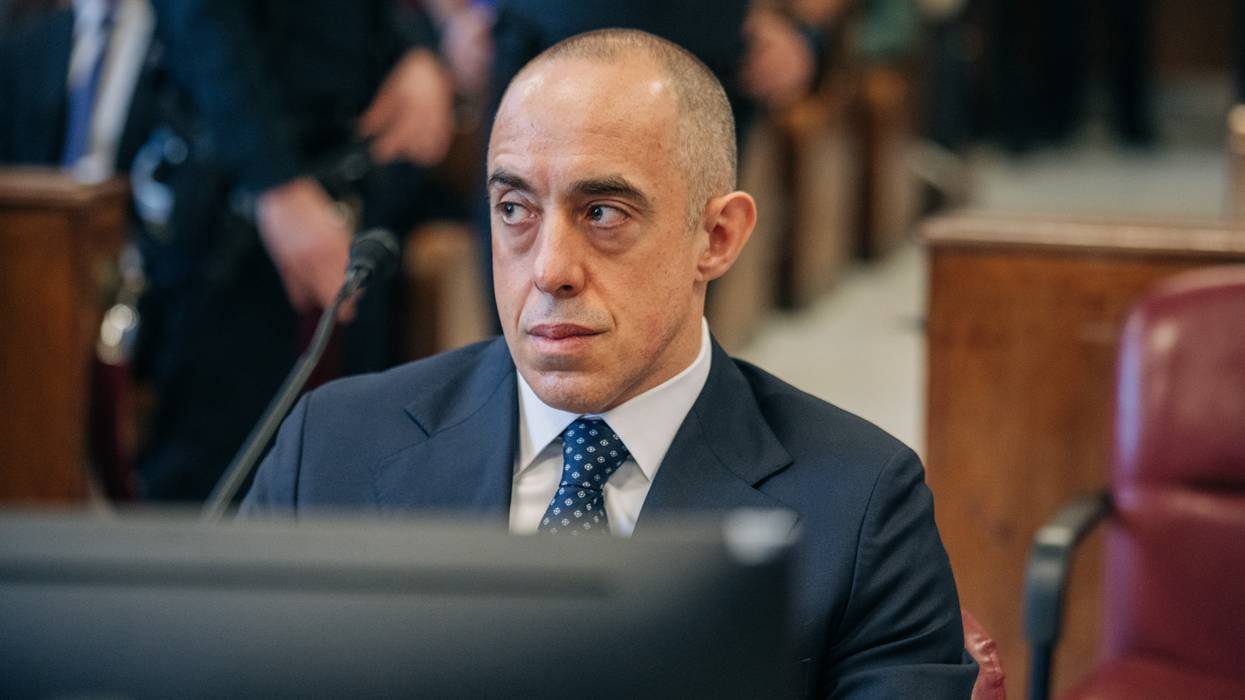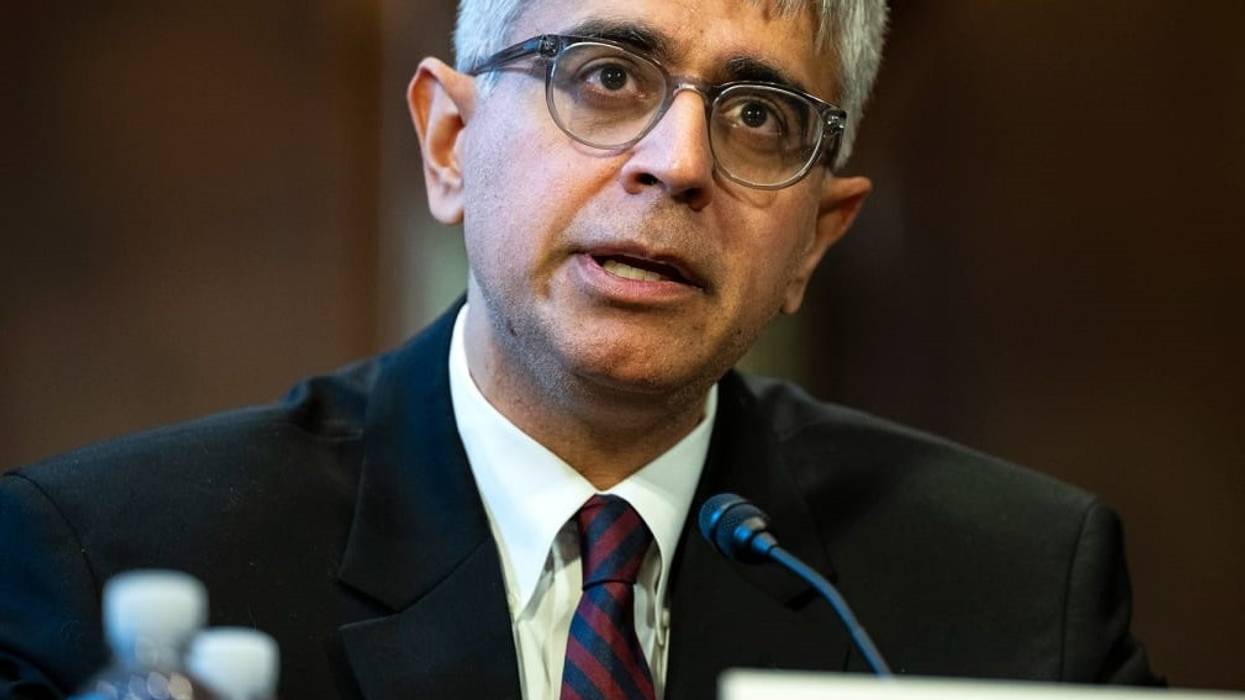Dozens of Former Judges Join Call for Senate to Reject Bove's Judicial Nomination
"Mr. Bove's egregious record of mistreating law enforcement officers, abusing power, and disregarding the law itself disqualifies him for this position."
With two days to go until the U.S. Senate Judiciary Committee is set to vote on advancing the judicial nomination of President Donald Trump's former personal attorney, Emil Bove, more than 75 former federal and state judges wrote to lawmakers to demand they reject the "deeply inappropriate" appointment.
Confirming Bove to a lifetime seat on the U.S. Court of Appeals for the 3rd Circuit would not only "compromise the integrity of the courts" and "set a dangerous precedent" that "personal fealty rather than constitutional duty" can secure judicial power, said the judges, but would also elevate someone who has allegedly "plotted to violate court orders," according to a recent whistleblower report.
The judges noted that the whistleblower, former Department of Justice lawyer Erez Reuveni, has offered to testify under oath and has provided the committee with "compelling evidence" that Bove told DOJ staffers to "ignore" any court orders that challenged Trump's mass deportation operation—yet the Republican-controlled panel has not invited Reuveni to speak to lawmakers.
On Tuesday, committee Chair Charles Grassley (R-Iowa) rejected a request to hold additional hearings on Bove's nomination before voting, saying they were "unnecessary."
"The Senate has a duty to hear that testimony," said the former judges, including Republican-nominated former circuit judges J. Michael Luttig, Timothy Lewis, and Paul Michel.
The judges wrote that "Mr. Bove's egregious record of mistreating law enforcement officers, abusing power, and disregarding the law itself disqualifies him for this position."
The letter is only the latest push to stop senators from confirming Bove, currently the principal associate deputy attorney general at the DOJ. The Leadership Conference on Civil and Human Rights, a coalition of more than 240 civil society organizations, wrote to senators last month, saying Bove does not meet the "basic requirements" to be a federal judge, including being "fair-minded, well-qualified, and committed to civil and human rights."
Like the Leadership Conference, the judges on Tuesday pointed to Bove's views on and conduct regarding the January 6, 2021 attack on the U.S. Capitol, which the DOJ official "refuses to condemn." Bove also investigated and fired dozens of FBI agents who had been involved in probing the attacks, which were aimed at stopping lawmakers from certifying Trump's 2020 election loss.
"It is disqualifying alone that Mr. Bove targeted or terminated Federal Bureau of Investigation personnel and career DOJ prosecutors for honorably investigating violent criminals who assaulted police officers and intended to murder members of Congress and our nation's vice president on January 6, 2021," wrote the judges.
They also pointed to Bove's role in dropping corruption charges against New York Mayor Eric Adams, which prompted the resignation of several disgusted staff attorneys, and his record of belittling and abusing staffers when he was a federal prosecutor in New York's Southern District—a pattern that made him the subject of an email from defense attorneys who expressed concern about Bove's "power plays" and "professionalism."
"Mr. Bove's egregious record of mistreating law enforcement officers, abusing power, and disregarding the law itself disqualifies him for this position," wrote the lawyers.
Gregg Nunziata, executive director at the Society for the Rule of Law, said the "remarkable" letter demonstrated how "the case against Mr. Bove's confirmation" is "about fundamental unfitness for the judicial role."
The Senate committee is set to vote on Bove's nomination on Thursday, and Republicans on the panel are expected to approve the appointment—even though Sen. Thom Tillis (R-N.C.) previously said he would not support nominations of people who refused to condemn the January 6 attacks. After the committee vote, Bove would need to be confirmed by the full chamber.
On a questionnaire given to him by the Senate as part of his confirmation process, Bove said "the characterization of the events on January 6 is a matter of significant political debate," and declined to comment on his views.
On the same document, Bove did not rule out Trump's potential run for a third term—which would violate the U.S. Constitution's 22nd Amendment.
While the judges outlined Bove's unfitness for the lifetime appeals court seat, journalist Lydia Polgreen noted that as the committee moved toward a likely confirmation, condemnation should also be aimed at members of the Democratic Party who "caved to anti-Muslim smears" last year and failed to confirm veteran lawyer Adeel Mangi for the seat on the 3rd Circuit—leaving the spot open for Trump's former personal attorney.
As Common Dreams reported last year, Republicans on the Senate Judiciary Committee questioned whether Mangi condemned the September 11, 2001 attacks and the Hamas-led attacks on southern Israel in October 2023. They also accused Mangi of antisemitism due to his membership on the advisory board for the Rutgers Center for Security, Race, and Rights, which hosted speakers who—like more than half of U.S. adults currently—were critical of Israel.
The "monthslong onslaught of baseless, disgusting attacks on Mangi," as HuffPost reporter Jennifer Bendery called them, were successful, and convinced Sens. Catherine Cortez Masto (D-Nev.), Jacky Rosen (D-Nev.), and Joe Manchin (D-W.Va.) to vote against the "highly qualified, widely endorsed, successful litigator."
"The history of trying to fill this powerful court seat," said Bendery, "is just as infuriating as where it could be headed."

